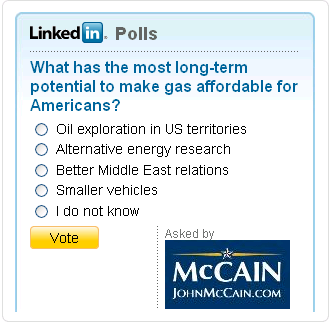I just took a McCain poll appearing on Linked-In. From a media perspective, the Linked-in poll idea is fascinating because once you respond, you get to see how other Linked-In users respond with results broken out by sex, age, industry. Wow, that’s powerful as a media experience for Linked-In and HUGE as a service for advertisers.

But right now, I’m particularly interested in the poll’s slant: “What has the most long-term potential to lower gas prices for Americans?”
The answers: “Oil exploration on US territories,” “Alternative energy research,” “Better Middle East Relations,” “Smaller vehicles,” and “I do not know.”
First, there’s no room for “other.” Second, most of the solutions imply, either directly or indirectly, government interaction. Third, the obvious answer, “the market,” is missing. The poll begs the question: is this a question a candidate needs to be thinking about?
If anything, the government should be raising prices on gas (through taxes) to help us all retool our life-styles to prepare for the day 10 weeks or 10 years from now when gas costs $10 a gallon. To those who say “if we save it the Chinese will burn it,” I’d say, “let the Chinese build their economy on waste and inefficiency, we’ll compete far better with them in ten years.”
In the long run, the best solution to high gas prices — the only real long-term solution — is higher gas prices in the short-term. People will stop driving SUVs, manufactures will rush to make batteries more efficient, entrepreneurs will figure out solar cells. There will be millions of solutions that no five-year-planning bureaucrat can imagine. And then the market will lower prices.

